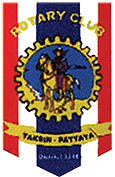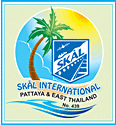- HEADLINES [click on headline to view story]:
-
New land ownership comments discussed at PCEC Sunday meeting
-
City holds fire drill at Long Beach Garden
-
Nightly Tai Chi exercise classes come to Pattaya
|
|
New land ownership comments discussed at PCEC Sunday meeting
The Sunday meeting of the Pattaya City Expats Club began
on August 16 at the Amari’s Henry J. Bean’s Restaurant when master of
ceremonies (emcee) “Hawaii” Bob Sutterfield called on everyone for a moment
of silence in memory of member Allen Briggs who recently passed away.
 Drew
Noyes, of PAPPA Co., advises PCEC members how to invest in property safely
in Thailand, for long time security. Drew
Noyes, of PAPPA Co., advises PCEC members how to invest in property safely
in Thailand, for long time security.
He then called on Richard Silverberg to introduce the guest speaker. Richard
noted that the speaker did not really need an introduction as he was well
known to the club and the expat community in Pattaya having been a long time
member and former club chairman. Drew is also a well known businessman in
Pattaya operating several businesses including PAPPA Co., Ltd., which offers
legal and visa services.
Drew started by mentioning that recent articles in the press about Thai
government officials’ comments on illegal land ownership by foreigners was
causing some alarm in the expat community. One article from Phuket included
a Land Office official’s statements about it being illegal for the Thai wife
of a foreigner to buy property. Another dealt with allegations of foreign
ownership of Issan farm land.
He said the case of foreigners buying farmland relates to people from the
Mideast arranging to have crops grown in Thailand for export to their home
country. In that case, Drew said the main issue was not so much a property
issue as it was an activity issue pointing out that agriculture is a
prohibited activity for foreigners. In the case of a Thai wife buying
property, Drew said there are legal ways for foreigners to provide money for
their Thai wives to buy property that will pass scrutiny.
Drew’s talk was informative and provided a lot of information of keen
interest to the large crowd. Drew provided some specific suggestions about
buying property and forming businesses. One area dealt with the formation of
companies to buy property. For a company to own land, it cannot have more
than 49% foreign ownership of its shares. In the past, lawyers set up
companies showing 51% of the shares being owned by Thais who really had no
investment in the company. This gave rise to the Land Office saying that in
such cases, it would investigate where the Thai owners’ money came from.
Drew said there were ways to pass such inquiries.
Drew then explained a process where the company is formed with limited
investment by the owners. The money to buy the land or condo is then
provided to the company in the form of a loan from the foreigner in return
for a mortgage on the property. The foreigner then leases the property from
the company. Drew emphasized that the money should first be wired into the
foreigner’s personal bank account; not to the company’s account. Further, he
said the Inbound Wire Transfer Agreement, formerly called a Tor Tor Sam,
needs to clearly state the purpose of the wire transfer, for example to loan
ABC Company money to buy property at location description.
In forming companies, whether to buy land or to operate a business, Drew
suggested care should be taken to avoid being over taxed. He said most Thai
lawyers include from 23 to 26 objectives for the company, which virtually
allows the company to do almost anything. This, he said, is not a good idea
because taxes are levied differently for different types of business
activity. Drew suggested the company’s objectives be limited to the actual
planned activity of the company. Other activities can be added at a later
date if necessary.
Drew also cautioned against buying a property by purchasing an already
existing company that owns the property. This is because the company owning
the property may have undisclosed liabilities, which you as the new owner
would be obligated to pay if claims are made later. He said it was better to
eliminate this risk by spending a small amount of additional money to form
another company to buy the property and thus adequately protect the much
larger investment.
Drew said that in any property transaction, due diligence and record keeping
is a must. He explained how titles are recorded at the land office and
showed everyone what it looked like. He noted that on the front is the
description of the property and on the back is the list of owners. The last
name on the list is the current owner of record. If a mortgage is recorded
against the property, it would then appear as the last item.
When buying property, he said to make sure to look at the original title so
you can see both the front and back. He said it was not uncommon for a
seller to show a photocopy of only the front side of the title to the
prospective buyer. Often, upon further investigation one finds that the
seller is not the actual owner of record or that there is a mortgage against
the property. Drew gave everyone some suggestions on how to ensure the
mortgage is paid in such cases. He cautioned against giving money to pay off
the mortgage to anyone but the mortgage holder or their legal
representative.
In conclusion, Drew cited an example of how one could protect oneself if
they have property in their Thai wife’s name especially when the “love is
gone.” He explained how a foreigner was able to prove to a Thai court that
he provided the funds to the wife for acquiring the property and get a court
order protecting his interest. Drew said he offers free consultations. He
can be contacted by telephone at 038-301-048 or 084-111-7999 or by email at
[email protected].
Emcee Bob thanked Drew for his excellent presentation. He then updated
everyone on upcoming events in and around Pattaya and called on Les Edmonds
to conduct the Open Forum. The Forum affords everyone with the opportunity
to ask questions or make observations about living here in Thailand,
recommend a good restaurant or movie, or even pass on a few jokes.
City holds fire drill
at Long Beach Garden
Sawittree Namwiwatsuk
Continuing its series of fire-prevention seminars around the city, the
Disaster Prevention and Mitigation Department descended on the Long Beach Garden
Hotel and Spa to demonstrate blaze battling in high-rise buildings.
 Firefighters
practice evacuating stranded guests during the fire drill at the Long Beach
Garden Hotel and Spa. Firefighters
practice evacuating stranded guests during the fire drill at the Long Beach
Garden Hotel and Spa.
Mayor Itthiphol Kunplome oversaw the Aug. 14 drill, nothing that Pattaya’s
increasing number of skyscrapers means fire-fighting skills are becoming even
more important.
Officials staged a mock fire on the hotel’s fifth floor that employees had to
handle. The practical training was complemented by a day of theory and
education.
Nightly Tai Chi exercise
classes come to Pattaya

Pattaya Tai Chi Club and Sattahip
District Tai Chi club members, along with Tavich Chaiswangwong (right), chairman
of Pattaya City Council, and Deputy Mayor Verawat Khakhay (2nd right) perform
Tai Chi at the official opening ceremony.
Sawittree Namwiwatsuk
South Pattaya residents looking to stay fit now have an alternative to
high-impact public aerobics classes and gyms with the introduction of Tai Chi
exercise classes at Pattaya School 8.
Operated by the Pattaya Tai Chi Club, the one-hour classes run weeknights
starting at 6:30 p.m. in the school’s multipurpose building. The slow,
low-impact exercises got their official start at an Aug. 19 ceremony attended by
city officials and Tai Chi enthusiasts from Pattaya to Sattahip.
Club Chairwoman Siriwan Thongampai said the classes are funded through the
city’s Public Health and Environment Department and have already attracted about
70 nightly members.
“The club was set up for people in the Wat Chaimongkol temple area for people
interested in exercise, staying healthy and who want to use their free time for
useful purposes,” she said, noting Tai Chi has been shown to reduce stress and
improve overall health.
Tai Chi, which literally translates from Chinese as “supreme ultimate fist,”
traces its originals to 16th century China when the first of five families
crafted their own interpretations of the Taoist philosophy of semi-mythical 12th
century figure Zhang Sanfreng into a hybrid martial art that combined meditation
with slow, low-impact movements.
Most westerns recognize Tai Chi from images of Chinese workers exercising each
morning in China. But classes have become popular worldwide in the past two
decades as baby boomers age and the art’s reputation as a low-stress training
method for seniors became more well-known. It was imported into Thailand in 1955
by Tong Eng Jia whose son became the country’s first Tai Chi instructor.
Researchers have found that intensive Tai Chi practice shows some positive
effects on balance control, flexibility, cardiovascular fitness and reduced
cholesterol. Despite its low-impact nature, the exercise burns almost as many
calories per hour as downhill skiing. It also has been shown to benefit those
recovering from chronic stroke, heart failure, high blood pressure, heart
attacks, multiple sclerosis, Parkinson’s Disease, and Alzheimer’s Disease.
|
|

News | Business | Features |
Columns | Mail Bag |
Sports | Auto Mania
Our Children | Travel |
Our Community | Dining Out & Entertainment
Social Scene | Classifieds |
Community Happenings | Books Music Movies
Clubs in Pattaya | Sports Round-Up
E-mail: [email protected]
Pattaya Mail Publishing Co.Ltd.
62/284-286 Thepprasit Road, (Between Soi 6 & 8) Moo 12, Pattaya City
T. Nongprue, A. Banglamung,
Chonburi 20150 Thailand
Tel.66-38 411 240-1, 413 240-1, Fax:66-38 427 596
Copyright © 2004 Pattaya Mail. All rights reserved.
This material may not be published, broadcast, rewritten, or redistributed.

|
|

Rotary
International

www.rotary-jomtien.org

www.rotary-taksin.org

|